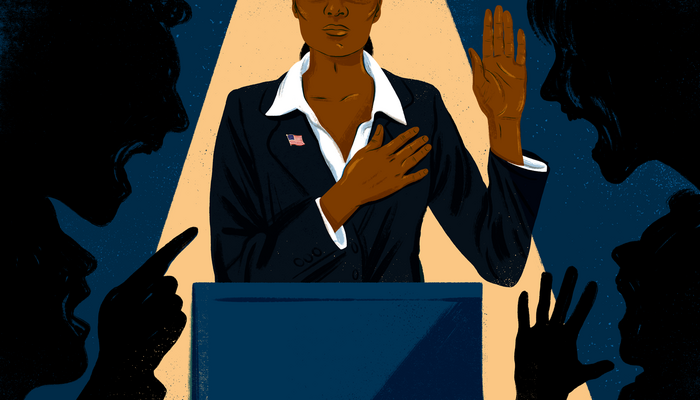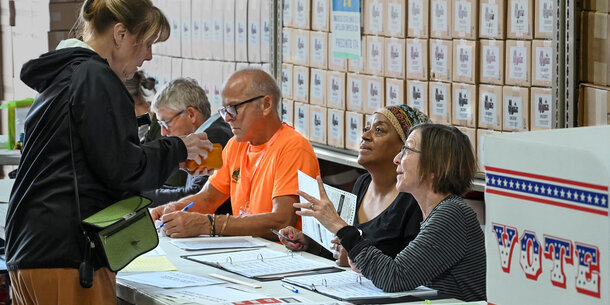This was originally published in Ms. Magazine.
In 2022, voters elected the most diverse Congress in history—but that’s not saying much. Congress remains overwhelmingly male and white: Legislators of color make up just 25 percent of the government body, while the overall U.S. electorate is 41 percent people of color. That gap is as wide as it was 40 years ago. One barrier to fair representation is abuse and intimidation—according to a new report from the Brennan Center.
We surveyed local and state officeholders about their experiences of harassment, intimidation, threats and violence. Officeholders at all levels of government face this abuse, and, as our report shows, it’s interfering with their ability to govern effectively—and it’s making them think twice about staying in politics.
These findings align with recent news headlines about political violence:
- Threats prompted former Republican presidential candidate Nikki Haley to request Secret Service protection.
- Authorities recently arrested a man who allegedly threatened to kill Representative Eric Swalwell and his young children.
- One day in January, 18 state Capitols were evacuated due to bomb threats.
In our study, 43 percent of state legislators and 18 percent of local officeholders reported that they had been threatened. We spoke to legislators who have faced death threats against themselves and their young children, an elected official who had his home visited in the night, and another whose car was shot at.
Officeholders across gender and race are experiencing abuse, but among local officeholders, the amount of abuse is disproportionately high for women and people of color. They were also more likely than white men to have their families targeted for abuse. In interviews, officeholders belonging to multiple marginalized communities reported that the abuse was compounded. Some lost count of the racist, misogynistic or homophobic slurs thrown at them.
This abuse has serious ramifications. Nearly 40 percent of local officeholders say that it lessens their desire to run for re-election, with women and people of color more likely than white men to say so. Women and people of color are already underrepresented in local and state government, and the climate of abuse could make that disparity worse. Oklahoma State House Minority Leader Cyndi Munson told us that she has had more difficulty recruiting women and people of color this election cycle than any other.
This crisis will affect Congress, too: Positions in local and state government often serve as stepping stones to federal office. In fact, almost half of the current Congress previously served in state legislatures. If women and people of color in elected office are driven out of politics by abuse, it could make the problem of underrepresentation even worse.
When the government doesn’t reflect the people it serves, its laws and policies risk being out of touch with the public it impacts. As majority-male state legislatures pass dangerous abortion bans across the nation, consider that women are more likely to identify as pro-choice and support the legality of abortion under any circumstance. In the 2022 midterms, higher numbers of women reported that the issue of abortion was “very important” to their vote. When women are shut out of government, abortion policy outcomes are artificially skewed—and senseless.
Even when officeholders are elected, abuse distorts policymaking. According to our report, more than half of state legislators believe that abuse has deterred their colleagues from taking on issues made controversial by so-called culture warriors. One state representative from Illinois told us that she decided not to lead bills on gun regulation while her children were young due to threats that were “too common and too on point.” Abuse not only can narrow the spectrum of people willing to run for office—it also can limit what they’re willing to advocate for once they get there.
Amidst huge demographic shifts, in which the share of white eligible voters continues to decline in all 50 states, representation of women, people of color, and other marginalized groups in government should be skyrocketing. Instead, we risk keeping public service out of reach for so many by leaving officeholder abuse unaddressed. Now is the time to act. When an officeholder is targeted for abuse, their fellow officeholders and community leaders should stand up and call it out. States should enact measures to protect legislators and ensure they spend more time working on policy and less time worrying about their families’ safety. This includes restricting open and concealed carry of guns in legislatures and allowing officeholders to access privacy protections for their home addresses.
Policymaking by more representative legislatures, unencumbered by intimidation, better serves all of us. Fair representation is about more than merely including women and people of color in government—it’s about creating a safe and equitable environment once they get there.



